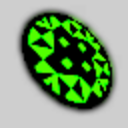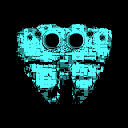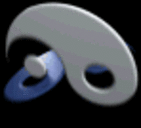Thinking of the original post, I had the idea that a simple question should be asked : what is a patch ? The answer would vary greatly depending on the musician. If you think of a score, it can be considered as different things : a mere tool for memory purposes (Gregorian chant), a canvas for musical execution (jazz), a work of art in itself (the greatest composers), among other things. I guess the same thing should be said about a patch. Answering this question might help one defining his approach. For instance, if you consider you're not skilled enough to build a "piece of art patch" (as I do), you should think about other uses of Pure Data. It took the musical score centuries to evolve, let us not be too presumptuous after just three decades.
-
PD and creativity: a patcher's lament
-
I like that thought Lucien. Let me put it metaphorically....
Imagine a woman that travels to the market because she wants to buy some potatoes. Once there, she finds the potatoes, buys them, and goes back home satisfied.
Now imagine a different situation. The woman travels to the market. Once there, she starts thinking about what she's doing there. An attendant tells her she needs to buy oranges. The woman buys the oranges, and goes back home thinking that she obtained what she wanted. But, somehow, she feels dissatisfied.
I live and love in Argentina
-
"The goal with all technology, especially in the arts, is to have it be extension of your idea, rather than just relying on the technology as a crutch. But the goal is to actually know it, be fluent in the language long enough where you can be expressive and know what you’re doing. You’re playing it, as opposed to it just playing you.
" -
@youaresound I am lucky, in that having worked all my life with the most talented musicians I have (despite a great desire) not the faintest spark of interest in making a musical patch.
But I love Pd.
It is a tool that allows me to grow old gracefully, automating everything I need for a performance and allowing me to concentrate fully on the art.
And I have the joy of the battle against the odds and learning something new almost every day.
David. -
Ok, I just realized how old the post is. But anyway...
Hello and excuse me if I repeat something that has already been said.
Think of pd as an instrument, it does not depend only on its complexity to offer good results. It always seems that something more complex is needed to obtain better results, but it is not true. Even a crystal glass can be a musical instrument.
Forget about the screen and concentrate only on the sound.
Try building a very simple instrument and assign everything to external controllers. If you play a violin, for example, you have access to all its parts, the same thing. Musicians don't look at their instruments while playing.
Practice all you can and don't record it, it's easier to be yourself when you know there are no records. You'll have time to do it later.
Everything influences, the place where you work, the light, people, etc... It helps, but it's really a mental thing.
And most importantly for me, do it like nobody's ever gonna hear it.
Good luck Liam. -
I'm happy to see this post come up again--it was a great conversation (and I miss @LandonPD).
My work has certainly moved forward in the past few years, and I now have a few musical pieces under my belt. However, I still find the same tendencies of getting sucked into the technical rather than the musical, and a lot of things written above still resonate. I estimate that I have spent between 10,000 and 15,000 hours building Context, and have come up with between 1 and 2 hours listenable music!
Part of the problem is that computer programming offers infinite possibilities at every turn. This is exhilarating, but also more than a bit confounding, as it can be very hard to know when to stop (or even where to start). I understand more and more why Brian Eno talks about limiting yourself arbitrarily--if you don't, you end up in some sort of mental stack-overflow.
Like David, I have also come to accept the fact that I am not actually a very musically creative person. I don't have my own musical ideas, and whenever I sit down to try to write something, I just draw a blank. The only times it has ever been successful are the times when I am working to a deadline: I have to produce a pieces of music for a performance, or else! Then what I have done is just to sit down and pick some random notes or numbers and alter them until they sound vaguely musical. Once I get something I'm happy with, I start attaching other ideas, then attacking new ideas to those, etc. The end result is always completely different to the type of music I had ever imagined composing--but I'm OK with that!
Incidentally, one of my unstated goals in designing Context was to create a tool which allowed me to "hack" the process of composition**. A DAW is very intimidating, and always kills my creativity from the onset. I wanted a small tool that could capture small ideas, and allow you to "connect" (literally) other ideas to it, a bit like a scrap-book. For me at least, this seems to be a successful approach. Whether anybody else can use it remains to be seen!
**John Lurie has referred to his music as "fake jazz". Sometimes I like to think of mine as "fake techno".
-
I agree with you. One of the most common problems is having too much. Less is more.
It's easy to say, not so easy to put into practice. -
@macrogmittrei It's a massive cliché, but so very true.
Good topic this - and nice to hear it's a common phenomenon and not just me. A lot of paragraphs starting with "i" to follow

I think the complexity can arise in many other forms of (particularly electronic) music production and compositon. When there are too many choices, it leads one to become blinded to what it is their actual objective. It happens to me a fair amount, and I usually step away from the computer at that point and do something different, or switch to a bit of hardware.
I do find that being able to mentally 'step away' and reduce the objective down into simple terms is the only way for me to progress. Easier said than done sometimes.
I also grapple with the identity of whether am I a musician, or a computer scientist/programmer, because I first and foremost believe that I'm on the creative end, so it's hard to rationalise creativity with maths, logic and connecting boxes. But, then I realise that the two are not mutually exclusive and can and do go hand in hand - we are merely mastering our craft. Committing, or recording work is a useful habit - to bring into a more conventional environment.
To touch on the 'going for a walk' subject raised a while back. I find that it is one of the few activities that I can figure out ideas with clarity - it's my best way to form objectives and clear my mind. Thinking too much about the detail is a deal breaker at that point. Just the idea and try to imagine the end point, and steps to reproduce it should bubble up to the surface (write it down??).
On an end note, I think I read an interview with Mark Fell of SND who is almost exclusively a MAX user. What resonated with me is that he tries to distill his patches in simplest terms - like one slider or knob that alters everything about the timing, timbre and composition. I find that highly inspiring!
boonier
-
The good thing about Pd is that you can really use it as software, but you can also turn it into hardware and design your own instruments.
And now that there are so many SBC's around and increasingly at better prices, it's much easier to create a dedicated instrument. You just have to learn something about GNU/Linux, maybe Arduino and basic electronics. Something you can learn in a very short time.




